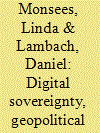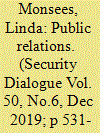| Srl | Item |
| 1 |
ID:
187078


|
|
|
|
|
| Summary/Abstract |
“Digital sovereignty” has emerged as a hot topic in European politics. But although true European digital sovereignty seems unattainable, analysing the digital sovereignty discourse is still useful since it tells us much about European politics. We examine three “projects” which are part of the broader digital sovereignty initiative: 5G, Gaia-X, and the semiconductor industry. This empirical perspective allows for a better understanding of how imaginaries about digital sovereignty play out in these specific tech projects and how these then help to affirm a particular European identity. Methodologically, we focus on how particular geopolitical imaginaries appear in these digital sovereignty projects. Our empirical analysis reveals that Europe’s comparatively weak digital industries are considered a security issue. China and, to a lesser degree, the United States are not only seen as economic rivals but also security threats when it comes to issues such as espionage and data protection. Based on this, we argue that digital sovereignty projects, despite being full of contradictions and tensions, contribute to a distinct EU identity of an agile, future-oriented global player in the digitised economy. This, while not entirely new, is a powerful imaginary even if the proposed idea of “sovereignty” might never be enacted.
|
|
|
|
|
|
|
|
|
|
|
|
|
|
|
|
| 2 |
ID:
170760


|
|
|
|
|
| Summary/Abstract |
This article contributes to the emerging literature on publics within critical security studies. Its particular focus is on contestation in the context of diffuse security technology. Contemporary security practices are characterized by diffusion and dispersion. As a result, contestation of security technology is also dispersed and diffuse and requires an account of publics that is sensitive to this aspect. The article conceptualizes ‘multiple publics’ as a mode of fundamental contestation of established political institutions. In order to do so, it discusses previous approaches to sociotechnical controversies and material participation. As a result of this discussion, it becomes apparent that we need a concept of publics that does not reduce political contestation to a pre-existing set of institutions. I develop a notion of publicness that emphasizes the way in which publics are embedded in societal struggles. This is achieved by reading John Dewey as a theorist to whom contestation is a vital part of democracy. It becomes possible to understand contestation against diffuse security practices – such as surveillance – as forms of emerging publics, even though they might not feed back into governmental decisionmaking.
|
|
|
|
|
|
|
|
|
|
|
|
|
|
|
|